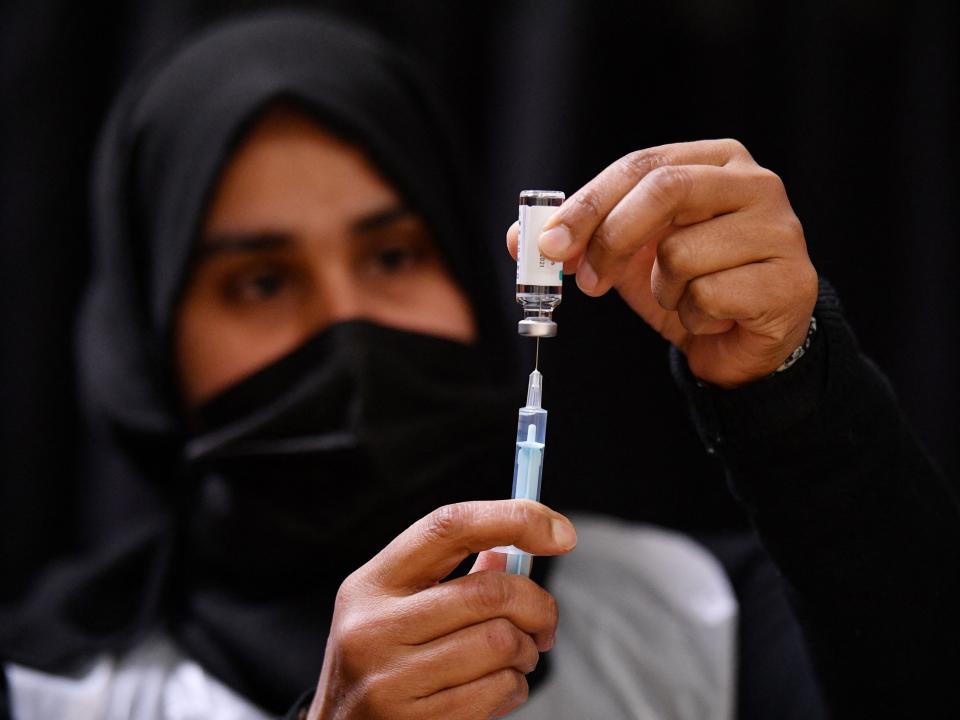AstraZeneca vaccine guidance could change again if wider UK situation changes, says JCVI member

Experts have warned that any reductions in uptake or the speed of jab deployment will increase the size of any third wave of infection in the UK
(AFP via Getty Images)The Joint Committee on Vaccination and Immunisation remains open to further revising guidance on use of the Oxford/AstraZeneca vaccine if and when necessary, a senior member has said, following the announcement that people under 40 should be offered an alternative to the jab.
Professor Anthony Harnden, deputy chair of the JCVI, said the group “may steer in a different direction” if the UK was to experience a future surge in cases and suffer a slowdown in dose supplies.
Both scenarios - although unlikely, according to experts and government sources - could elevate the risk of catching and developing Covid-19. At this point, the benefits of the AstraZeneca vaccine would once again far outweigh its risk, even in those younger age groups who appear more likely to develop the extremely rare blood clotting syndrome associated with the jab.
“We've made bold and quick decisions all along the way, and we're not frightened of making bold and quick decisions in the future as well,” Prof Harnden told a media briefing. “Certainly if the epidemiology changes or vaccine supply changes, we may well steer in a slightly different direction.
“The priority will be speed of vaccine deployment should we see infection rates starting to rise. Clearly we've got enough supply that we can offer an alternative and vaccinate quickly - but if there isn't quite enough supply and infection rates are rising, and we've got AstraZeneca, we would deploy that as well [to younger people].”
However, he added, the JCVI is “very cognisant of the fact that any changes can lead to loss of vaccine confidence and hesitancy, and we don’t want to make too many changes”.
The comments come after the independent body advised that people aged under 40 be offered an alternative to the AstraZeneca vaccine – a recommendation that the government has said it will accept.
Those aged 30 to 39 without underlying underlying health conditions will be offered the Pfizer or Moderna jab instead, where available, the JCVI said – as long as it does not cause any substantial delays in being vaccinated. The policy previously applied to people under 30.
Although there is an “extremely small risk” of people developing rare blood clots after having the AstraZeneca vaccine, the risk of serious illness from Covid-19 has also diminished for younger people due to falling infection rates fall across the UK.
While the balance of benefit and risk for the AstraZeneca vaccine remains favourable for older people, it is more finely balanced for younger groups, who are less likely to be hospitalised with coronavirus.
Urging people to accept vaccines, the JCVI warned that any reductions in uptake or the speed of jab deployment will increase the size of any third wave of infection in the UK.
A senior government source told The Independent that the change in policy would not impact the UK’s target of offering a first vaccine dose to every adult by the end of July, because of the availability of supplies provided by Pfizer and Moderna.
Prof Harnden said the JCVI, having collected more data, was now confident that the incidence rate of the rare blood clotting syndrome stands at roughly one in 100,000 for the overall vaccinated population, and at one in 60,000 for people in their thirties.
The latest data from the the Medicines and Healthcare products Regulatory Agency (MHRA) shows that, up to 28 April, there had been 242 cases of rare clotting in the brain combined with low platelet counts following vaccination using the AstraZeneca jab, with more than 28 million doses administered to date.
Some 24 cases were reported in people aged 18 to 29, 31 in those in their thirties, 38 in people in their forties, 68 in people in their fifties and 67 in those aged 60 and above, with the age not known in the remaining cases.
More than a fifth of the rare blood clots were in people aged under 40, and two-thirds in those under 60, the data shows.
This contrasts with the proportion of people in different age groups who have been vaccinated. By 25 April, 5.5 million people under 45 had received a first dose, compared with 22.6 million of those 45 and over.
Following the JCVI’s new guidance, the NHS National Booking System for Covid-19 vaccines is being updated to implement a twin-track approach that will allow people under 40, along with pregnant women, to book a Pfizer or Moderna jab specifically.
Pregnant women were told last month that they should receive an alternative to the AstraZeneca vaccine, but were struggling to access other jabs. Previously, the NHS booking service provided no information on this, while GPs said they could not offer different vaccines to expectant mothers.
Meanwhile, a MHRA source has said they expect the Johnson & Johnson vaccine to be approved shortly, having reached the advanced stage of its rolling review. That will provide the UK with a fourth approved jab to choose from for its rollout. However, deployment of the vaccine is not imminent.
Read More
UK Covid-19 vaccinations: Latest figures
Covid: India strain found in England is declared ‘variant of concern’

 Yahoo Finance
Yahoo Finance 